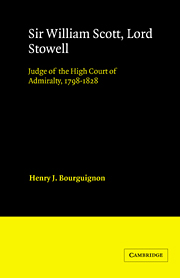Book contents
- Frontmatter
- Contents
- Preface
- List of abbreviations
- 1 Survey of English admiralty jurisdiction: how did it vanish?
- 2 Sir William Scott – a biographical sketch
- 3 The law of the instance court
- 4 Prize law: nationality – a study in detail
- 5 Prize law – a survey
- 6 Scott's judicial philosophy
- 7 Scott's influence
- Appendix: the Stowell notebooks
- Bibliography of primary sources
- Index
- CAMBRIDGE STUDIES IN ENGLISH LEGAL HISTORY
7 - Scott's influence
Published online by Cambridge University Press: 29 October 2009
- Frontmatter
- Contents
- Preface
- List of abbreviations
- 1 Survey of English admiralty jurisdiction: how did it vanish?
- 2 Sir William Scott – a biographical sketch
- 3 The law of the instance court
- 4 Prize law: nationality – a study in detail
- 5 Prize law – a survey
- 6 Scott's judicial philosophy
- 7 Scott's influence
- Appendix: the Stowell notebooks
- Bibliography of primary sources
- Index
- CAMBRIDGE STUDIES IN ENGLISH LEGAL HISTORY
Summary
For nearly a century after Sir William Scott, Lord Stowell, had completed his lengthy tenure on the admiralty court, his numerous decisions were read and respected by judges and commentators who considered questions of admiralty law and international law. Scott's younger contemporaries appeared overawed by his work. Francis Holt, in an elaborate dedication to Scott of his work on shipping law, asserted that he knew of no instance in which the common law courts had questioned any of Scott's decisions when they had occasion to consider them. Arthur Browne, professor of civil law at the University of Dublin, also dedicated his work on the civil law to Scott, pointing to Scott's ‘superior knowledge and unrivalled administration of the civil law, and of the law of nations’.
Throughout the nineteenth century, Scott's prize judgments continued to influence British writers on international law. William Hall and T. J. Lawrence, for instance, repeatedly cited Scott's judgments as a leading, often as the only, authority for various doctrines of international law. During the First World War, Scott's biographer the uncritically laudatory registrar of the admiralty court, E. S. Roacoe, could still refer to Scott's prize judgments as the ‘corner-stone of one branch of British jurisprudence’.
It would have been surprising if Scott's enormous contribution to admiralty law and international law had not been well received in Britain. A far better index of Scott's influence comes from an assessment of the American legal writers who could approach his work with no suspicion of chauvinism.
James Kent was widely respected in the United States throughout the nineteenth century, both as a legal scholar and as Chancellor of New York.
- Type
- Chapter
- Information
- Sir William Scott, Lord StowellJudge of the High Court of Admiralty, 1798–1828, pp. 280 - 285Publisher: Cambridge University PressPrint publication year: 1987



